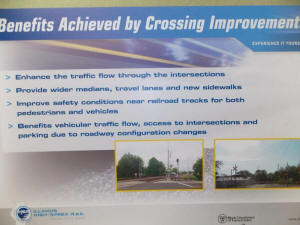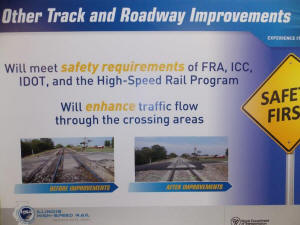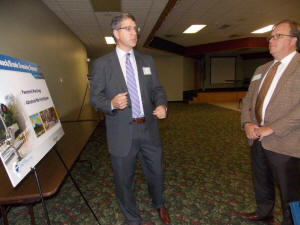|
 Guests were greeted and signed in and then were connected with team
representatives who would answer questions. Guests were greeted and signed in and then were connected with team
representatives who would answer questions.
The consulting groups have engaged with communities from the
inception of the new project. The federal government committed $1.2
billion in economic stimulus funding in the $1.5 billion project.
The Illinois Capitol Bill appropriated $400 million for high-speed
rail.

Community involvement has been encouraged with a focus on improving
rail safety at crossings.

The new rail system comes just in time to overhauling the aging rail
line replacing cross timbers with safer concrete ballasts, new rock
beds and rails. Not only do the upgrades offer faster and safer
passenger travel, but also provides for continuing and expanded
freight transportation.

Phil Pasterock of the High-Speed Rail Program Management Team (left)
and Scott Speegle of IDOT walked guests through exhibits depicting
at-grade plans for Lincoln crossings and about the full rail system
renovation.
Pasterock emphasized that the at-grade rail crossings in Lincoln and
other community areas along the line will feature the newest
high-reliability safety features. Quad-gates that full block traffic
from either direction, pedestrian gates, and loop detection that
sends a signal to train engineers if there would be the presence of
pedestrians or a vehicle on the track.

Safety has
been the emphasis of this full project, from train passengers to
vehicle drivers to pedestrians.
Already new concrete ballasts, rails and rock have been installed.
Recently, attractive black wrought iron fencing that adds beauty and
pedestrian safety has been added near Lincoln's downtown areas.
[to top of second column] |

Lincoln has seven at-grade crossings in town. At the request
of the city of Lincoln Pekin Street will be closed off as part
of the city's takeover of the Depot property. That is the only
crossing that will have a change.
Illinois has five Chicago to Saint Louis trains running each day
and one cross-country to Texas. The representatives said that
the same number of passenger trains would continue to stop in
Lincoln.
Travel times will gradually decrease as track work is completed
and the new trains take to the tracks. Currently it takes 5.5
hours by train to travel the full route from Chicago to Saint
Louis. That time will decrease in 2015 to 5 hours, and in 2017
to 4.5 hours.
 By this time next year, November 2015, trains are expected to be
running 110 mph on the 200-mile section between Dwight and
Alton, and on the entire St. Louis-Chicago corridor by 2017.
Test runs began in the fall of 2012 between Dwight and Pontiac.
Six sets of all new train engines and passenger cars are on
order and expected to roll-out in 2016. ADA compliant, "These
will be new double deck cars," Pasterock said.
Currently, train engines and cars are leased from Amtrak.
Speegle said that the state will own the new cars and engines,
but Amtrak would continue to be the operator as contracted.
Meal service will continue as currently offered, which is select
café style items for sale on local runs, and a better quality,
full meal on the long-distance trains.
[Jan Youngquist]
The Project Vision:
More than 90 percent of the over 35 million corridor trips have
origins or destinations in Chicago or St. Louis. A more balanced
transportation system in the corridor would provide travelers
with greater mobility options. To achieve this, either a new
transportation mode must be introduced, or improvements to an
existing, less frequently used intercity passenger rail mode
must be made. Reduced travel time, increased service
reliability, and enhanced safety would attract travelers from
automobile and air travel to a new or improved rail mode of
transportation.
See more at the High-speed Rail website:
http://www.idothsr.org/
Past related articles
City considers closing Pekin Street crossing
Public hearing set for Monday
Historic Lincoln Depot to be restored to its
original 1911 footprint
City Briefs: Council tours depot
Mayor Keith Snyder offers a walk-through tour
of the Lincoln Depot
|